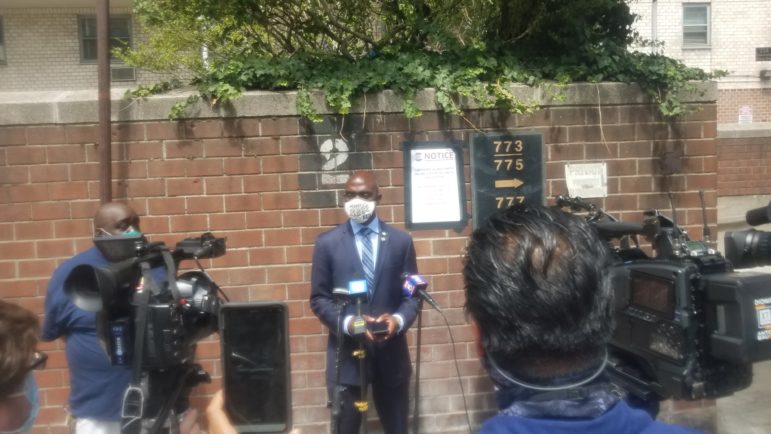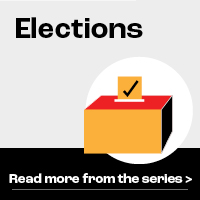
At least four candidates in the crowded Democratic primary to replace retiring Bronx Rep. Jose Serrano say there were irregularities in last Tuesday’s voting.
The strongest criticism came Friday came from Assemblyman Michael Blake, who placed second in the votes tallied on June 23, and is preparing a lawsuit.
Councilmember Ritchie Torres placed first, but the tally so far does not include an unknown number of affidavit ballots filed by voters who went to the polls but weren’t allowed to submit a regular ballot.
Large number of votes outstanding
Also outstanding are the absentee ballots. At least 46,000 such ballots were mailed out to District 15 voters, but it is unclear how many voters received them in time to mail them on Primary Day, as was required, and did so.
Blake, one of 12 candidates on the Democratic primary ballot, says those two pools of ballots—the affidavit ballots and the absentee votes—reflect some of the irregularities in the voting. At a Friday press conference, Blake alleged that at least one election site, P.S. 93, generated so many affidavit ballots “the police had to be called in,” and he said it was unclear where those ballots are now.
Blake also said his campaign was prevented from photocopying the list of addresses to which absentee ballots were sent, but permitted to copy the 46,000-person list by hand—a request that seemed more designed to frustrate efforts to check with voters than to protect their privacy.
The Board of Elections did not respond to requests for comment.
Long lines and a closed polling place
Blake ticked off a litany of other problems with the June 23rd voting.
He said some voters were told they were not registered, only to complain and prove that they were—raising the possibility that less persistent voters were turned away.
Danny Barber, a Blake endorser who is the president of the tenant association at NYCHA’s Andrew Jackson Houses, says he has been voting at PS/MS 29 at 58 Courtlandt Avenue for 30 years.
“On Election Day I was told I could not vote at PS/MS 29 and I had to go to 851 Grand Concourse because 29 was no longer my polling site. I didn’t accept that so I reported it to the Board of Elections and requested that a supervisor come out, which happened,” Barber, who also leads the Cityide Council of Presidents of NYCHA resident associations, said Friday. “I was allowed to vote by ballot—not by affidavit—because I wouldn’t take ‘no’ for an answer.”
Others were given only one of the two ballots needed to participate in both the presidential primary and the state primary. Some polling sites opened late, featured long delays, or used entrances that were less accessible than in past elections or were poorly signed, Blake alleged. As was the case around the city, many voters received absentee ballots only after Primary Day; some, Blake said, received two identical ballots.
The largest concern, Blake said, was the decision to close a long-used polling place at Concourse Village, a rich source of Black votes in the heart of Blake’s Assembly district. According to his campaign, the move of that poll site to a place eight blocks away was announced only a week before the election, and if Concourse Village residents checked the Board of Election’s address-search tool, they were actually directed to a third site—not the right one.
The Assemblyman did not suggest that there was an effort to elect any particular candidate, but he did allege that the problems at polling sites were too numerous and serious to be a coincidence. “When a polling place that has existed here for decades and is literally the largest turnout of Black votes in my Assembly district, you have ask yourself, why was the polling place moved?”
“Moving a polling place from the base of the Black vote is the essence of voter suppression,” Blake said.
As he spoke Friday, a small gathering of Concourse Village residents—including passersby—agreed that the movement of the polling place was an unwelcome surprise.
Blake said he was demanding a full city and state investigation of the conduct of the election, as well as emergency action to count absentee ballots even if they are mailed after the June 23 deadline.
There are 1,000 election districts in the Bronx, and according to Board of Elections lists, only 39 changed voting locations between the 2019 general election and the June 23 primary. The most election district changes (10) occurred in the 81st Assembly district, which was not involved in this Congressional race. In Blake’s Assembly district, there were seven changes. In the 87th AD, which partly overlaps with the Congressional district, six EDs changed polling sites.
Multiple candidates have complaints
The race in the 15th district was perceived by many observers to be a two-person affair between the well-funded Torres and his Council colleague Ruben Diaz, Sr., a conservative minister with a loyal following. The conventional wisdom was that the dominant dynamic in the race was ideological, and that Diaz might prevail if progressives—especially Torres and Samelys Lopez, who had the backing of many left-leaning groups—split the anti-Diaz vote.
There were also racial factors in the mix, however. Eight of the candidates on the ballot were Latino, and four—Blake, Chivona Newsome, Marlene Tapper and Marc Escoffrey-Bey—were Black.
With substantial financial firepower, significant union support, decent name recognition after his run for public advocate last year and an Assembly district that comprised a good-sized chunk of the Congressional territory, Blake was seen as having a chance to galvanize Black support and seize the Democratic nomination for a seat that has been held by a Latino since Herman Badillo was elected to it in 1970.
“It seems to me that when there was a chance for an African-American to go to Congress, things got much harder,” Blake said.
Other campaigns also raised concerns about the balloting. “I’ve received numerous reports my name was left off the absentee ballots and at polls sites,” Chivona Newsome, the Black Lives Matter leader who placed eighth, told City Limits. “Voters who had not changed residences were shuffled from polling site to polling site. “
Marlene Tapper, who ran a shoestring campaign and placed ninth, says her name was left off some ballots and that voters who were still in line at 9 p.m. at some polling places were not allowed to vote, contrary to law.
“One poll worker told me they were not informed until 9 in the morning [three hours into voting] that there were not one but two ballots,” Melissa Mark-Viverito, the former Council speaker who placed sixth, told City Limits. She was not certain, however, that the evidence pointed to a systematic effort to thwart Blake. “Is it intentional or is it sheer negligence and incompetence?”
Toward the end of her City Council tenure in 2017, Mark-Viverito attempted to break from tradition and name a Manhattan commissioner to the Board of Elections without the approval of the county Democratic leader, Keith Wright. The move was depicted as an act of cronyism on her part, but she contends that severing the link between the party and the board is essential to developing a more independent election authority.
It is unlikely that any irregularities affected Mark-Viverito’s distant finish, or Newsome’s or Tapper’s. But the number of questions circulating about the district 15 vote is proof, the former speaker says, that “Something drastic has to happen with the Board of Elections.”










3 thoughts on “Allegations of Irregularities in Bronx Congressional Voting”
In 2020 these tactics are still prevalent. Disgusting!!!
I agree
Agreed